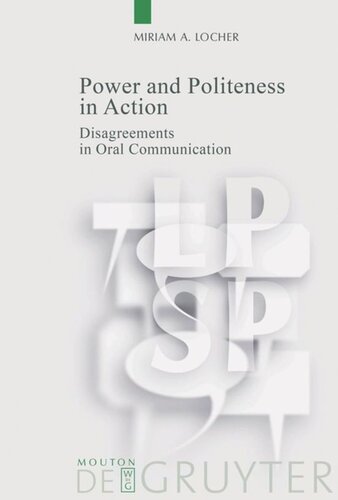

Most ebook files are in PDF format, so you can easily read them using various software such as Foxit Reader or directly on the Google Chrome browser.
Some ebook files are released by publishers in other formats such as .awz, .mobi, .epub, .fb2, etc. You may need to install specific software to read these formats on mobile/PC, such as Calibre.
Please read the tutorial at this link: https://ebookbell.com/faq
We offer FREE conversion to the popular formats you request; however, this may take some time. Therefore, right after payment, please email us, and we will try to provide the service as quickly as possible.
For some exceptional file formats or broken links (if any), please refrain from opening any disputes. Instead, email us first, and we will try to assist within a maximum of 6 hours.
EbookBell Team

4.3
18 reviewsThis study investigates the interface of power and politeness in the realization of disagreements in naturalistic language data. Power and politeness are important phenomena in face-to-face interaction. Disagreement is an arena in which these two key concepts are likely to be observed together: both disagreement and the exercise of power entail a conflict, and, at the same time, conflict will often be softened by the display of politeness (defined as marked relational work).
The concept of power is of special interest to the field of linguistics in that language is one of the primary means to exercise power. Often correlated with status and regarded as an influential aspect of situated speech, the workings of the exercise of power, however, have rarely been formally articulated. This study provides a theoretical framework within which to analyze the observed instances of disagreement and their co-occurrence with the exercise of power and display of politeness. In this framework, a checklist of propositions that allow us to operationalize the concept of power and identify its exercise in naturalistic linguistic data is combined with a view of language as socially constructed.
A qualitative approach is used to analyze the concepts of power and politeness. The material for analysis comes from three different contexts: (1) a sociable argument in an informal, supportive and interactive family setting, (2) a business meeting among colleagues within a research institution, and (3) examples from public discourse collected during the US Election 2000.